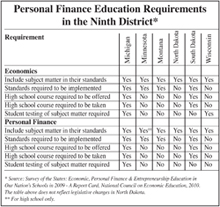April 21, 2011 at 9:03 a.m.
April is youth financial literacy month
Area students provided personal finance courses only as electives
From loan officers in community banks to the state capitol and beyond-- the question is how can Americans become better-educated borrowers and money managers, and avoid the pitfalls and potholes in 21st century economics?
The President of the United States and Minnesota Governor Mark Dayton have declared April to be "Youth Financial Literacy Month." But just issuing an elaborate proclamation doesn't make it so. When youth aren't actually receiving instruction in personal finances, any gain in their "literacy" is going to be elusive.
North Branch School District for example, offered a personal finances course as part of its "Marvelous Mondays" no-school day enrichment sessions, and nobody signed up for it.
Wolf Creek, the on-line charter school based in Chisago City, provides a consumer math course as an elective, and instructor Sandy Flint says it's not popular.
"It may have something to do with the fact it shows up (on the list) as a 'math' course," she commented. When students are searching for an elective, math isn't usually a first choice. She added that Wolf Creek administration is reviewing this course and may not offer it next year.
Some states are finding the only way to ensure students are being educated in smart consumerism is by mandating schools provide personal finance classes. The Minnesota legislature looked into mandating this instruction a couple sessions ago but the sentiment was there's no funding to increase mandates and it wouldn't be politically acceptable to push this.
(Courses requirements in other states include instruction on taxation and paycheck withholding; college costs; making a household budget; checkbook mechanics; saving for a large purchase; credit cards, and understanding mortgages and investments. The courses fall under various categories, math, social studies and business curriculum.)
The National Council on Economic Education says the number of states adopting requirements for students to receive education in personal finance is increasing, but much more needs to be done.
Chisago Lakes instructor Jason Mahlen would agree.
He remarked how odd it is that certain subjects become "required" for a Minnesota student and other subject areas remain elective. Mahlen and Dana Wood are the instructors of personal finance classes at Chisago Lakes High School and the course is offered as an elective to all four grade levels.
Mahlen said approximately 200 students enroll in a year. He added, "It's surprising" how little knowledge students possess when entering the personal finance class.
According to advocates of youth financial education, providing people instruction on how to manage their money is an important cornerstone of general economic success.
Gov. Dayton and his administration are not pushing for a mandate at this time, but are enlisting educators in an effort involving local partners.
The JumpStart Coalition is one such organization. It is holding a free event April 26, in St. Paul. JumpStart welcomes parents, educators and others to learn more about personal finance for young people. The event is from 4 to 6 p.m. at the MCIT Building at 100 Empire Drive. A tradeshow will feature resources from about 10 organizations working in this field.
The Federal Reserve Bank, in a recent quarterly publication it calls "Community Dividend," analyzed some issues that contributed to the last few years of economic crisis and the Fed article concluded that there needs to be enhanced education of the next generation of consumers.
The Ninth District of the Federal Reserve did a study and reported that of the six states in the fed's ninth district (see chart) only one state-- Michigan-- required personal finance courses, and testing the student. Last year North Dakota took a step in that direction when a state legislator-- who is also a high school teacher by profession-- introduced a bill effective as of 2010 requiring "the concepts of personal money management" to be included in curriculum. North Dakota does not require testing. Yet.





Comments:
Commenting has been disabled for this item.